- Home
- Gregory Maguire
Confessions of an Ugly Stepsister Page 5
Confessions of an Ugly Stepsister Read online
Page 5
“Don’t ask me for the truth, for cats lie in the sun, and dogs lie in the shade, and I lie whenever and wherever I can get away with it.” He grins saucily. “She’s a hidden child to Haarlem’s prying eyes, so few can prove it or deny it. But the rumor mongers would have it so. And the Master would swear it in court if it would get him a decent commission.”
“You talk with too much freedom of your Master’s concerns,” says Margarethe stiffly. Caspar laughs. “I’m serious,” she goes on. “You’re a servant here, as we are; what license allows you to squawk such an opinion against him?”
“Youth,” says Caspar, pointing a finger at himself.
Margarethe purses her lips. “Youth is a liability to be outgrown as quickly as possible.”
They are a match for each other, Caspar and Margarethe. Iris is amazed.
“Come,” says Caspar. He leaps up and tugs Iris’s hand. “Do you want to see the paintings he has done of you?”
“I forbid it!” cries Margarethe.
“Oh, what’s the harm?” says Caspar. Iris is surprised and bothered by Caspar’s touch, and if only to break away from him, she jumps up as if in assent. She hands her bowl to Ruth, who settles the windmill inside it, up to its little wooden neck in emerald peas.
“Iris, will you imperil our position here?” asks Margarethe.
Iris can’t answer her mother. Caspar has Iris again by the faintest of touches. Walking backward, he draws her into the studio. “Why shouldn’t we learn by studying the Master’s work; it’s why we’re here, isn’t it?” says Caspar.
“I am here being silent and helpful,” says Iris, to be truthful, “not to learn.”
“No master restricts learning, or he is no master,” says Caspar. At last he drops Iris’s hand—she feels immense disappointment. Sudden hollowness. Ridiculous!
Caspar pivots heavy panels from their careful angles, drying here, there; he finds the one he is looking for, and pushes it out into a waning shaft of sunlight that falls in one corner of the room.
“A study of . . .” says Caspar. Words fail him then.
Iris puts her hands to her mouth.
Margarethe has been unable to maintain her posture of superiority. Out of interest or a motherly tendency to chaperone, she has followed them into the chamber.
“Oh,” says Iris, “oh.”
“It is a good likeness,” says Margarethe at last.
“It is severe,” Caspar concedes.
“It is severe, and true,” says Margarethe. “Iris is plain to look at. Painfully plain. Don’t exaggerate her physical virtues, Caspar; it does no good in the end. She must accept it like the rest of us.”
Iris on the canvas is well painted, to be sure; even Iris can see that. The colors are magic: a field of black lit with topaz, against which human figure and sprays of wildflowers glow in uncompromising light. The girl is a study in human ordinariness. Yes, it stops shy of grotesquerie; that would be Ruth, or worse. But the eyes are flat, lacking in intelligence; the lips pursed, practicing resentment; the brows furrowed, the chin weak, the nose large. It is entirely Iris, or the Iris that she can guess at when she catches her own image in mirror or puddle or window glass. But it isn’t the Iris whose hand almost throbbed with a terrified life of its own when Caspar grabbed it. It isn’t the Iris who tends to Ruth when her mother has had enough. It is another Iris, a smaller one, secured on canvas thanks to ivory, olive, and smudged umber.
“Do you see what he is doing?” says Caspar.
“Oh, wipe your eyes, you make yourself worse,” says Margarethe roughly, and thrusts a rag at her younger daughter.
“Do you see his efforts, do you understand?” says Caspar.
Ruth comes in, pointing at the canvas with surprise. Even she sees the likeness. Oh, hell’s unholy agents!
“He’s taken and flattened all that is attractive in you,” says Caspar. “It’s like a lie that has enough resemblance to truth to convince for a brief moment. But you must not take it for gospel. He has used the—the grammar of your features to spell out a sentence. Do you know what it says?”
Iris can’t speak.
Margarethe grunts, “It says that with all we have been through, we’re lucky to be eating every day, and sleeping safe under a roof. We’re lucky if we’re not being hunted down by some brimstone-breathing fiend from hell. That’s all it says. Come, girls.”
“It says,” Caspar insists, “it says nothing about luck, nothing about Iris, nothing about girls. It says only one thing. It says: Aren’t the flowers beautiful?”
Iris isn’t sure she can hear the dreadful painting say anything of the sort.
“Don’t you see?” says Caspar. “Here is a clutch of wildflowers ripped from the meadow, and here’s a peasant girl paused to catch her breath. They’re the same thing; they’re about simple values, which are natural, not artificial or cultivated—”
“You embarrass everyone, keep still,” says Margarethe. “You’re making it worse. Caspar, what good have you done us?”
“She likes to look,” says Caspar. “Don’t you know this about your daughter?”
“She can scarcely look, her eyes are streaming with silly tears.” Margarethe doesn’t move to hold her daughter. Iris knows that isn’t her mother’s way. But Margarethe’s voice is cold in her daughter’s defense, and for a moment that is warmth in itself.
“Stop this nonsense,” says Caspar. “You’re an apprentice as much as I am, Iris. Don’t look at yourself on the canvas. Look at the painting of the Master. It doesn’t matter whether he gets the commissions from the titled families of Europe. He’s a genius, though none know it but we in this room. Look at the painting: here is your luck. You are a part of a small masterpiece. You will live forever.”
Caught forever as a slab-cheeked pike!
Iris runs from the room and stands on the other side of the open doorway, her sides heaving as if they will split.
Margarethe doesn’t follow her. She says to Caspar, “You’ve broken a household law of the Master’s. I’ll advise him to release you from your bondage to him. You’ve done damage to his intentions, as if the damage you’ve done to my daughter’s spirit isn’t enough.”
Caspar says, “Oh, hush. You don’t have the power to recommend a thing to him, and he doesn’t have the power to release me even if he wanted. As for Iris, she’ll come to thank me, in time, for the eye needs education, and she has an eye. You’re more the fool to be so blind to it.”
“And an ‘eye,’ as you call it, will find such an ugly girl a husband?” says Margarethe. “When the time comes, an ‘eye’ will help her be happy at her chores at hearth and table, at well and garden, in the bed and over the graves of her children? You, for all your airs, are young enough to be almost entirely stupid.”
“An eye will help her love the world better, and isn’t that why we live?”
“And who will love her?” says Margarethe. “I think it won’t be you, young Caspar.
She has cut him. Iris, out of sight, knows it, because for once he is silenced. Margarethe mutters beneath her breath about the portrait of Iris with poking sprays of gold and amethyst flowers. “Raw cruelty, but raw honesty,” she avers.
Ruth is the one who lumbers out of the room, following the trail of muffled sobs, to comfort her sister by bringing along the pretty plaything, the windmill. It doesn’t comfort Iris, but she twirls the arms anyway, trapped into being pleased, for stupid Ruth’s sake.
Half a Door
Caspar’s strategy to lift the Master’s spirits has worked. The next morning Schoonmaker is in fine form. He rouses the girls and Margarethe with a comical song, and Caspar stumbles from the bed, bleary-eyed and crazy-haired, groggy and grateful at once.
“Hilarity at this hour? It’s hardly Dutch,” says Caspar. “This can’t be Holland. Where are we, Padua, Rome, Marseilles?”
Iris rubs her eyes and thinks once again: Yes, where are we? Where in the world, or out of it?
“Get yourselves in
breeches, wash your face, you,” says the Master, “and Iris, no sitting today. Take your sister to the meadow, now—”
“They haven’t had a morsel,” says Margarethe. “It’s cold in the meadow at this hour. Hoarfrost in the lane, and even the doves in the eaves have chilly throats—”
“—let them take bread with them, and stay there till they’re sent for. They can run races to warm up. I’m expecting important company this morning. There’ll be no sitting today.”
“I will not sit for you again,” says Iris in a small voice.
“Tomorrow is time enough,” says the Master.
“Never again,” says Iris, more loudly. Caspar blushes and ducks his head into a clean shirt, and stays there, like a turtle retracted in its shell.
“What manner of revolution is this?” says the Master, hardly listening. “Margarethe, I’ll need your help at my ablutions. Are you skilled at clipping beards?”
“Give me the knife and expose your throat, and we’ll find out,” says Margarethe.
“Everyone so cheery this morning,” says the Master hastily. “Well, no matter. My own blemished self will have to serve. What are you chattering about, Iris?”
“I’ve seen how you paint my face,” says Iris. She has thought the words out, and struggles to say them in an even voice. “You view me with humor and contempt. You’ve made me look the fool. I already look the fool in my own eyes. I won’t be put forward to look the fool to the world.”
“So, you’ve broken my law, and peered at the paintings the moment my back is turned?” The Master’s voice is distant-thundery soft.
“It was Caspar’s suggestion,” says Margarethe, shooting the young man a look. He twists in his shirt comically.
“Oh, Caspar,” says the Master, contempt and dismissal intermingled. “One expects nothing better of him. Caspar, come out of that shirt, you ass. I’ll have your head on a platter by noontime if you don’t stop your games. Iris, I have more to do today than to kiss away tears of hurt feelings. Off with you, girls, off, off! A patron is coming by, and the floors, Margarethe, must be swept and the paintings arranged to be seen in the best daylight.”
Iris is pushed aside, her brave thoughts spoken but unheard. The Master has other matters on his mind.
“We should run away,” says Iris fiercely to Ruth. They hold hands and leave the noise of aggressive housecleaning behind them. Along the lane a crippled old dame comes poking with the aid of two sticks. Her back is gnarled nearly double, and her horny hands are tied to the canes so she can’t drop them.
“Looking for that painter fellow,” she screeches at Iris, “the one who likes old crippled crabapple trees like me. I’m the Queen of the Hairy-Chinned Gypsies, and I can blow smoke rings out my bottom. Where is he? Tell me, or I’ll curse you into the bottom of a well, where you’ll have no one but frogs to hear your confession.”
Ruth, who is timid of most people, keeps behind Iris, no doubt frightened by the crone’s bread-loaf chin, with its thin growth of pig-bristle white whiskers. Iris isn’t scared, though; for some reason she thinks about the dame hidden in the shadows near the quay that first day. The one who had said to Margarethe, “You tell your own way!” Iris says, “I’ll tell you where the Master lives, if you’ll magic him into the bottom of a well!”
“Change him into a slug and hit him with my shoe,” says the crone agreeably. “After he paints me and pays me first. Immortality calls, so who am I to keep myself to myself? Tell me where to find him.”
“If you promise,” says Iris. The crone leers. Oh, to it, then. “The house just beyond, with the big window and the half door.”
“Queen of the Gypsies, Hen to the Cheated Chicks, Dame of the Damned, Sow to the Suffering Sucklings, Midwife to the Changelings, Mother Abbess to the Whores, of whom you’ll never be one, you ugly thing. Better go turn yourself in at some convent already, and save yourself the trouble. Bless you, child, and stand aside. I start lunging and I can’t stop.”
The crone moves off, more like a splayed-leg bug skittering along the surface of a pond than a Queen. Midwife to the Changelings, thinks Iris. Can you tell us then about Haarlem’s changeling child?
Iris wants to follow. She’d love to see a curse lowered on the Master. To watch him reduced to a slug! She doesn’t dare. Instead, she takes Ruth’s hands and they hurry along. Iris mutters, “We should go back to the quay and find the boat on which we came, and head back to England. We’re not at home here among crazy painters. I hate this madhouse. I hate him. Why would anyone want to see such a painting? Do you think the patron is coming to see that very painting? Take your fingers out of your mouth, you look a mess.”
The meadow is still full of the same late flowers, though they now are browning, bug-chewed, going to seed. Iris can hardly bring herself to sit there, because she feels she is imitating the painting: ill-favored young woman shown up by the commonest of weeds.
Once Ruth is settled, happily, with bread to gnaw, Iris climbs the boughs of the apple tree as she has before, and makes her way into the second tree that affords a view over the city walls. She watches the Master’s household, to see what kind of guest might take it into his head to visit. There’s no sign of the Queen of the Hairy-Chinned Gypsies. Probably turned away from the door with a wooden shoe planted in her smoky behind. The Master is in no mood for diversions today.
Iris doesn’t have long to wait. Almost before the rest of Haarlem is awake and about its business, a gentleman comes striding from the better district, along the lane to the Master’s house. He wears a tall hat with a buckle so brightly polished that it gleams even from this distance, and he sports a cape with a more than generous cut. A lace collar settles on his shoulders like the sepals of a rose, cradling his ruddy countenance. It’s an intelligent face, made the more pointed by a well-trimmed goatee and flourishes of mustache. Next to him, thinks Iris with pleasure, the Master looks a bloody potato eater.
The gentleman stands outside the door of the Master’s household for a moment, contemplating the situation. Perhaps he knocks. The door swings open, and there’s Caspar, more neatly attired than Iris has yet seen him. Iris hasn’t settled on her feelings about Caspar after yesterday. She’d rather not despise him, but somehow he seems in collusion with the Master at her expense. How little she matters in this household!
Caspar ushers the guest inside, and the bottom half of the door swings closed, to keep stray cats and pigs and rude dwarves from wandering in.
Iris says to Ruth, “Why should we be sent to pasture like a pair of disobedient goats?”
Ruth just chews her bread.
“I’ve given what I had to give, whether I wanted to or no; why shouldn’t I learn what is made of me?” says Iris. “Who is he to send us packing?”
Ruth falls back against the grass, enjoying the sun on her face.
“Don’t eat lying down, you choke, you know you do,” says Iris. “Ruth, sit up.” Ruth sits up, fussing.
“I’ll be back for you. If the cows come just yell at them. You can yell when you want to,” says Iris. “Will you be all right?”
Ruth shrugs.
Iris leaves. It’s only a matter of moments, now that she’s familiar with the terrain, before she is slowing to a tiptoe and approaching the house, bent over so as not to be seen. She creeps up to the door. It’s a warm day for mid-autumn, or maybe the Master wants as much ambient light as he can get; the top half of the door is still open. Iris crouches against the bottom half, her arms hugging her knees, listening. The front studio is just inside, and the Master is issuing his thoughts in a public voice. Bravado, thinks Iris, but it doesn’t really disguise his fear.
She’s pleased at his discomfiture. Still, she’d rather he be a dead slug on the floor.
She listens and tries to sort out the occasion. Apparently, the visitor is looking at paintings; the Master and Caspar are setting one painting after another up in the best light. There are Annunciations and Lamentations and Nativities; there are Saints B
asil, Nicholas, and John the Baptist. “And patrons, in their holiest of aspects,” says the Master, “I can do women with veils, I do lace as in this study of Catherine of Cleves, and pearls of the finest luster. Notice the skin tone, cherry underpainted with a fine olive-blue, an achievement in both grinding and application that is not common knowledge among my peers—”
“Young von Rijn of Amsterdam has superior flesh tones,” murmurs the guest, “and his handling of light, even for a youth, is remarkable. He paints the light of holiness itself. One can’t imagine how it is done. Grace of God, one guesses.”
“God works through pigment and varnish, just like the rest of us,” says the Master with as generous a sigh as he can muster. “May we all aspire to the achievements that Rembrandt von Rijn will accomplish. In the meantime, let’s keep ourselves to the matters at hand. Now, Caspar, show Heer van den Meer the studies of flowers that he requested. Let my woman take that flask for you—Margarethe! Please—and here—are you comfortable, take the bench—here—Caspar, a little this way—just so. Voilà.”
“Mercy,” says Heer van den Meer in a noncommittal tone.
“Exactly,” says the Master, bravely.
“One can hardly attend to the flowers,” says Heer van den Meer. “Who is the unfortunate child? Is she a composite from your wicked imagination?”
“She’s as clever as she is homely,” says the Master. “Who can know how God chooses to work His way in this world?”
“I think there was never a girl of Holland so plain.”
“She is mostly of England. They are homely there.”
“England, say you? How does she come to sit for you?”
“My bosom bursts with charity for the unlucky,” sighs the Master. “Such a big heart. It’s my curse. A commission from you would help me keep her fed.”
“Keep her off the street, you’d do us a service,” murmurs Heer van den Meer. There’s a little hollow laughter, and Iris hears her mother blandly say, “Will that be all, gentlemen?”
There is silence. “Of course, I’m also impressed by the flower pieces of Hans Bollongier,” says the guest. “It was his work that gave me the notion—”

 Missing Sisters
Missing Sisters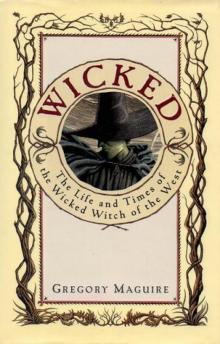 Wicked: The Life and Times of the Wicked Witch of the West
Wicked: The Life and Times of the Wicked Witch of the West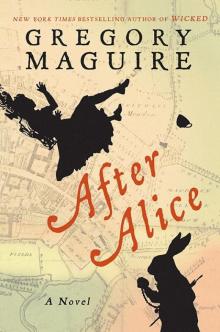 After Alice
After Alice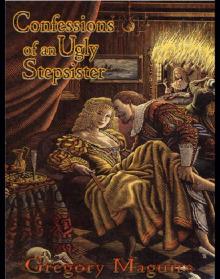 Confessions of an Ugly Stepsister
Confessions of an Ugly Stepsister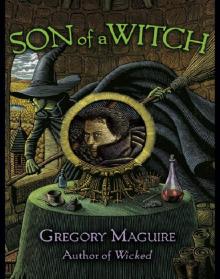 Son of a Witch
Son of a Witch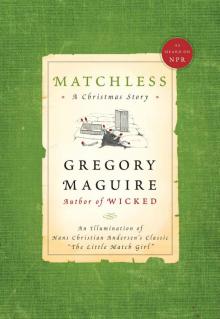 Matchless
Matchless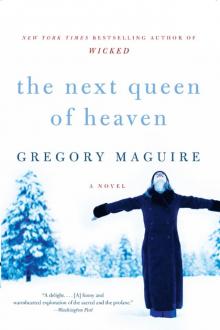 The Next Queen of Heaven
The Next Queen of Heaven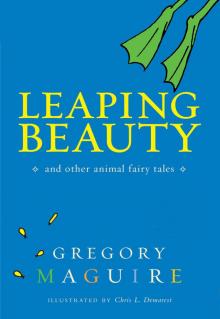 Leaping Beauty: And Other Animal Fairy Tales
Leaping Beauty: And Other Animal Fairy Tales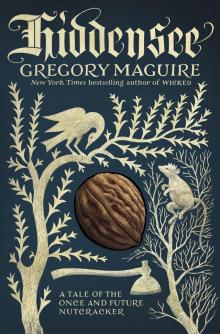 Hiddensee: A Tale of the Once and Future Nutcracker
Hiddensee: A Tale of the Once and Future Nutcracker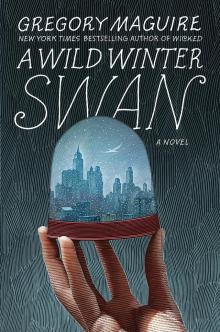 A Wild Winter Swan
A Wild Winter Swan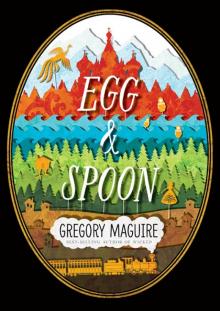 Egg & Spoon
Egg & Spoon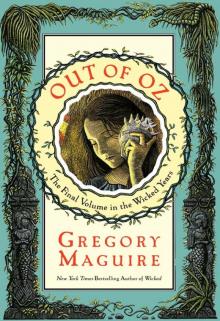 Out of Oz
Out of Oz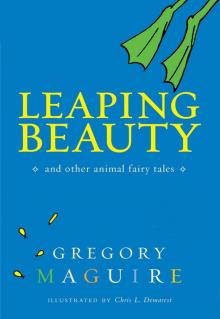 Leaping Beauty
Leaping Beauty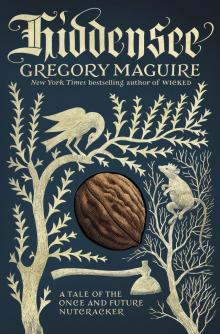 Hiddensee
Hiddensee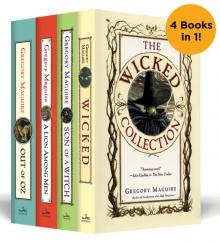 The Wicked Years Complete Collection
The Wicked Years Complete Collection The Next Queen of Heaven: A Novel
The Next Queen of Heaven: A Novel